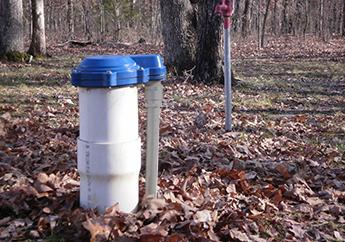
Groundwater is one of Missouri’s most vital natural resources. Wells are used to access groundwater for drinking and irrigation, to monitoring aquifer health, to provide geothermal energy for heating and cooling, and to collect geologic information. Well construction is regulated in Missouri to protect our groundwater resources. Well and pump installation contractors must be permitted by the department in order to do business in Missouri. Well construction requirements are determined by geologic, hydrologic and environmental factors.
Nearly 3 million Missourians depend on water wells for their drinking water. Over the years, construction methods for water wells have evolved from being dug by hand, bored with augers, and hammered by cable tool rigs to drilling with air rotary or sonic drill rigs. Over time, thousands of water wells were abandoned without being properly plugged. A well is considered abandoned when it can no longer produce water, transport water to its point of use, or causes a contamination risk to groundwater and has not been used for two or more years. Please report abandoned wells to us.
